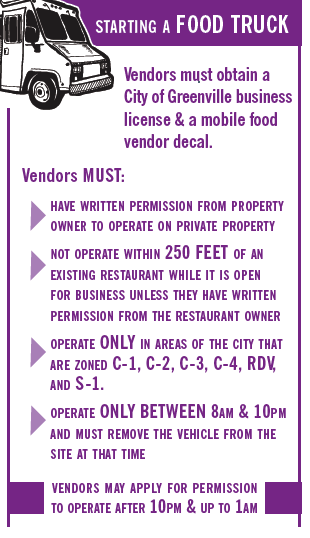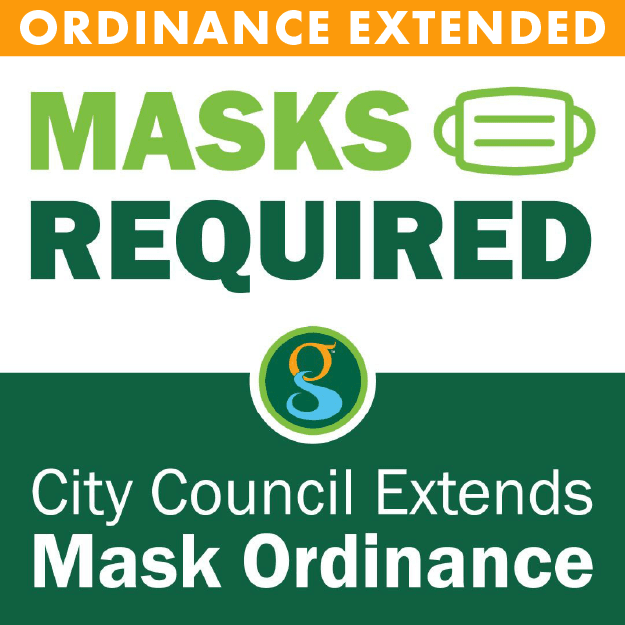So you’re not quite ready to own a full restaurant but want to try your hand at some sort of food operation. How about a food truck?
The common thinking? That’s the easier route.
But what presents as a simpler foray into restaurant ownership in the city of Greenville’s competitive market has proven, for some, to be more difficult than expected with regulations about when and where trucks can operate in order to protect established restaurants’ business.
“The city values the growing foodie scene in Greenville and wants everyone to be successful,” says Mary Douglas Hirsch, real estate development manager with the city. “There is room for everyone, and we work to identify solutions and strategies for all segments of the restaurant industry. In 2013, as the city saw the growing demand from our community for food trucks, staff worked with food truck vendors and restaurant owners to address any concerns on the front end and to develop a food truck ordinance to help provide structure.”
Others have thrived and even grown their food truck business into more than one truck or a brick-and-mortar location. After five years on the road, Nick Thomas transitioned Automatic Taco to a brick-and-mortar location in The Commons food hall. Anmar Natheer of Keepin’ It Fresh took over operation of The 05 restaurant on Augusta Road with the same menu as his truck.
“The challenges of operating a food truck are certainly difficult, and can quickly extinguish the ambitions of many cubicle daydreamers after looking into the process,” Thomas says.
He lays out some of the initial process.
“If you manage to find your truck, invest heavily to get everything up to code, wade through the red tape of city permitting and establish a business license that is just as costly as a restaurant, then you are finally ready to start cooking,” he says.
And once you get there, that’s just the beginning. What comes after has caused several trucks in the last few months to cease operation.
According to the city of Greenville’s records, as of March 3, only 17 food trucks of the 30 from the Aug. 28, 2019, list remained registered to operate within city limits.
“One of those challenges is the new fire-suppression code,” Thomas says. “This is an extremely costly endeavor and has put some trucks out of commission due to the sheer cost.”
Most older trucks do not already have the necessary fire-suppression system in place.
The more stringent fire-suppression requirement that went into effect Jan. 1 is a statewide adoption of the newest edition of the International Fire Code. As such, all municipalities in South Carolina are required to enforce it. Food-truck owners were notified in November of the change, and in order to operate in 2020, the $3,500 system had to be installed and inspected by the fire marshall.
Jeff Bowman, business license supervisor for the city, works with food-truck operators to help keep them in line with regulations.
“For the fire-regulation change, they notified the vendors by mail, email and phone,” Bowman says. “Because the fire regulations were mandated by the state, the city did not have the authority to grant a grace period.”
The Black Thai food truck had a newer truck and the capital to make the necessary updates, says Dean Johnson, co-owner, but he knows many truck owners are working paycheck to paycheck, making a new regulation and associated costs a hindrance to survival.
Mobile Meltdown, owned by Lauren Kulesz (pictured), was one of the trucks that had to shut down, and there are others in the same boat.
Kulesz says there are other factors to consider, including various fees for DHEC inspections and certifications, the weather, finding the right locations, and costly maintenance on trucks.
“With all of that being said, if you can establish your truck and make the right connections, it can certainly become fruitful,” Thomas says. “The Greenville community is very receptive of small local businesses and will give their support if the product is backed by creativity and diligence.”
What are the city’s food truck regulations?
- To operate in the city of Greenville, mobile food vendors must first obtain a city of Greenville business license and a mobile food vendor decal.
- Food trucks are prohibited from operations on any city-owned property unless approved by the city as part of a permitted special event or contracted with the Parks and Recreation Department or parked in a city designated food truck parking space within the assigned dates and times.
Once approved, mobile food vendors are allowed to operate on private property under the following circumstances:
- Mobile food vendors must have written permission from the property owner to operate on private property.
- Mobile food vendors may not operate within 250 feet of an existing restaurant while it is open for business unless they have written permission from the restaurant owner.
- Mobile food vendors are only permitted to operate in areas of the city that are zoned C-1, C-2, C-3, C-4, RDV and S-1.
- Mobile food vendors are permitted to operate only between 8 a.m. and 10 p.m. and must remove the vehicle from the site at that time.
- Vendors may apply for permission to operate after 10 p.m. and up to 1 a.m.
The post Food trucks face regulatory speed bumps appeared first on GREENVILLE JOURNAL.











